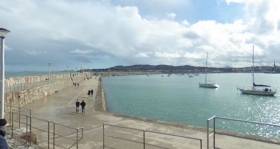Displaying items by tag: Challenge to Cruise Berth
#CruiseBerth - An environmental Dublin Bay group’s challenge over an €18 million terminal berth for cruise ships at Dún Laoghaire Harbour writes The Irish Times will be heard later this year at the Commercial Court.
The Save Our Seafront (SOS) group opposes the planned development for reasons including that it was allegedly approved without proper identification and assessment of its impact on the environment and on recreational users of the harbour, including small boat users and on regattas.
An environmental impact statement failed to consider that people walk on the pier to enjoy fresh air and the view of the Dublin mountains, and to consider the effects on their enjoyment if a large cruise ship is obscuring the view and “emitting diesel and sulphur fumes”, the group said.
Potential Impact
It also claims the potential impact on marine mammals, including otters and the Minke whale, was inadequately assessed.
Mr Justice Brian Cregan was told on Monday the sides had agreed the challenge, brought against An Bord Pleanála with Dún Laoghaire Harbour Company as a notice party, could be heard by the Commercial Court. The judge said the case was suitable for the court and fixed it for hearing on October 10th.
The harbour company sought to have the case fast-tracked for reasons including it regards the successful development of the cruise terminal berth as “an important element” in securing the port’s financial future, and to replace the loss of revenue resulting from the cessation of ferry services.
While it had hoped to have the berth open in time for the 2018 cruise season, construction had been delayed as a result of the case, it said.
For more on the story including the Habitats Directive and Rockabill to Dalkey Island special area of conservation, click here.





























































